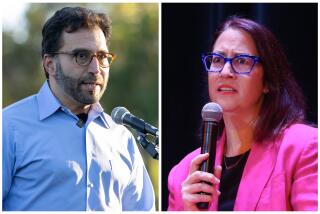Beilenson’s Not Afraid to Utter the ‘T-Word’ : Taxes: The massive federal deficit demands increases, the Democratic congressman says.
- Share via
Talking about tax increases in an election year may strike terror in the hearts of most politicians, but not Rep. Anthony C. Beilenson.
Angry about the massive federal budget deficit and what he says is a leadership vacuum in Washington that has left the problem unresolved, the outspoken Los Angeles Democrat this week renewed his call for higher taxes.
“This nonsense about not being able to raise taxes is just that--it is nonsense,” Beilenson said at a breakfast meeting with reporters Monday.
The veteran lawmaker, whose Westside-San Fernando Valley district is one of the richest in the nation, said he wants to raise income tax rates to 38% for those who earn more than $200,000 a year. The top tax rate now ranges from 28% to 33%.
He also favors higher gasoline taxes, unspecified consumption taxes, a transfer tax on stock transactions and a doubling of cigarette taxes to help erase the red ink in the federal budget. He opposes any cut in capital gains taxes as unwarranted.
Blaming President Bush and Congress for failing to close the gap between federal spending and revenues, the seven-term congressman described the $152-billion deficit as “the most serious problem that faces the country.” Beilenson noted that the national debt has grown from $930 billion to $3.3 trillion in the last nine years.
He warned that the nation’s standard of living was eroding because of the budget and trade deficits.
“These continuing deficits . . . have got to be undermining the standard of living, not only of this generation, but most especially and immorally, the next,” Beilenson said. “We are putting a huge amount of debt on coming generations because we refuse to tax ourselves at a rate adequate to pay for the services.”
Beilenson estimated that the federal government could raise an additional $20 billion a year by increasing the tax rate to 38% for incomes in excess of $200,000 a year.
Such an increase would be felt in Beilenson’s predominantly Democratic district, which spans the Santa Monica Mountains and includes such upper-income enclaves as Bel-Air, Beverly Hills, Pacific Palisades, Brentwood and Malibu.
Beilenson said a tax on stock transactions could dampen volatility in the stock market. And a gasoline tax of 25 cents per gallon, which he has advocated unsuccessfully for years, could encourage development of higher-mileage cars and discourage continued dependence on imported oil.
He discounted the political danger of advocating higher taxes, saying he is being honest and the voters like that in a politician. “I’ve discovered over the years . . . that saying the right things and doing the right things is usually the smart political thing to do,” he said. “People around here know that the economy has got problems, the deficit is a real problem and that we have got to respond to it, and that part of the response has got to be an increase in revenues.”
Beilenson predicted that his Republican challenger, Beverly Hills businessman Jim Salomon, will raise more money and do better at the polls this November than he did when he received 33% of the vote in 1988. “If this man is well-financed, obviously he will do better than he has in the past.”
Salomon collected more than $111,000 last year and forced Beilenson to abandon a policy of not raising campaign funds in non-election years.
On another topic of interest to voters in his heavily Jewish district, Beilenson said he will not vote for legislation by Rep. Henry Waxman (D-Los Angeles) to provide $7.5 million in federal funds for a Holocaust museum at the Simon Wiesenthal Center in West Los Angeles.
Beilenson said the federal government is supporting construction of a Holocaust Museum in Washington. “I don’t think we should be underwriting or helping to underwrite a series of similar museums or memorials in various parts of the country,” he said.
On a purely political note, Beilenson said he opposes two measures on the June ballot to change the way congressional and legislative district boundaries are drawn. He said that Republicans were treated unfairly when Democratic leaders redistricted the state after the 1980 Census, and that he, as a maverick Democrat, was also given a less-safe district than some of his colleagues. But he said legislators are still the most qualified to redraw the district lines.
“No matter who does it people just will not be satisfied,” he said. “The whole thing is such a messy political job.”
More to Read
Get the L.A. Times Politics newsletter
Deeply reported insights into legislation, politics and policy from Sacramento, Washington and beyond. In your inbox twice per week.
You may occasionally receive promotional content from the Los Angeles Times.










